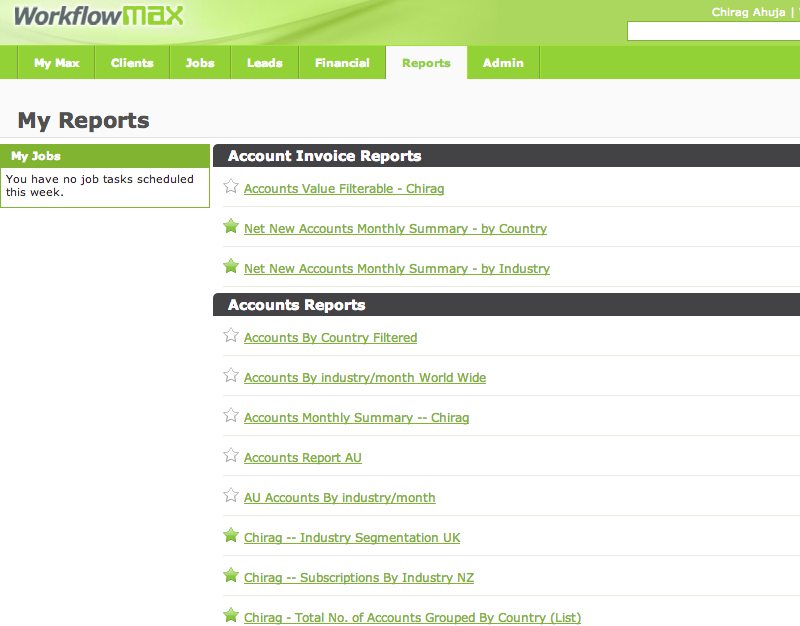Accountants have this reputation – deserved or not – for being uptight, humorless bean counters. Previously, this reputation has served them well, because this is exactly the type of person you want in charge of your money. Because accountancy is a necessary part of doing business on any scale, an accounting firm could basically count on a customer to walk through the doors and – provided the firm didn't seriously screw up – be with that firm for at least ten years. It seemed that the bean-counter business model was set in stone.
But who is counting the beans now? With cloud-based accounting software automating the data entry and reporting process, what exactly is the accountant's role? How does an accountant market their business in a world where business owners believe a cloud-based app can replace them?
Accounting is Thriving in the Cloud

One of the overarching themes at the recent Xerocon Australia conference was empowering accountants to take advantage of all the new tools and opportunities available to them through the cloud. Rod Drury, Xero founder, talked about how he sees the cloud ecosystem changing accounting and business in the future.
Cloud-based accounting and bookkeeping software is making the data entry side of finance redundant, and graphs and reports can be created at the push of the button. Compliance is only going to get easier as the software develops. Many doomsday predictors are calling for the end of accountants; in the brave new world of the business future, all accountancy work will be done by a computer.
This simply isn't possible. Computers can do a lot, but there is no substitute for the experience and human element of a good accountant. A computer can store and process data, but it can't see the bigger picture in the same way that an accountant can.
The future for accountants is a bright one, provided firms can take advantage of the opportunities opening up through the Cloud. Accountants understand business better than anyone, and they can help shape and direct a company toward future growth. They're not just counting the beans - they are making sense of them.
"It's an old adage, but in business, you don't know what you don't know," Michelle Malcolm, associate principal business advisory at WHK says in a recent article in NZ Business. "The guidance and advice of a good accountant in the critical early years can help set you up for success. The failure rate of new businesses in the first 12 months is alarming and partnering with the right accountant can make all the difference."
The Accountant as Business Advisor

First, we need to take a closer look at the business advisory role of the accountant.
In a recent podcast at the Xero Summer Camp, Dennis Howlett, an industry analyst and diginomica founder, explains that the most successful accounting firms are those that simply wouldn't exist without the cloud. The cloud changes the way firms think - it gives freedom to accountants to fit their business around their life. Now you can work on your iPad while you drop the kids off at school, and check in with clients on your vacation. Now you can manage overseas accounts with ease, and collaborate with professionals from all corners of the globe.
Howlett argues that it's the culture of a firm that determines if they're going to succeed, given the changing dynamics of accounting. You can see this in the world of small business, where technology is empowering small business owners to self-organize networks, without regard to the established framework of the larger firms. If a firm provides no value to the business beyond the preparation of financial statements, and if the partners aren't motivated to change, that firm will likely fade away.
Cloud-based computing can - and should - be seen as a huge advantage to accountants, as if frees up a huge amount of time for professionals to provide a range of specialized business services. Accountants can step up their advisory role, but providing much needed advice and support around the following areas:
- revenue growth
- succession planning
- tax minimization
- setting direction and strategy
- business structure
- risk minimization
- improving profits
- cashflow management
- personal finance and retirement planning.
Accountancy services now encompass a huge variety of expertise, from IT support to risk assessment, personal finance and succession planning, forensic services and strategies for entrepreneurs. An accountant can add value to a business by identifying potential problems before they surface, figuring out ways to save you money on your tax obligations, and help the client plan for the future.
So how does an accountant find new clients who are interested in these services? Here are our tips:
Streamline Your Sales Channel

When a customer enters the doors of your firm, they are looking for a complete business solution. They want one single point of contact to discuss their business issues with, and for that one person to meter out work to the required professionals. They don't want to visit several different divisions within the company and get asked the same questions. They don't want ten different points of contact. They want everything to be seamless, simple, and central to the business' success (kind of like cloud-computing).
Think From Your Customer's Perspective
The first thing an accounting firm needs to assess is the customer experience. You want to do away with a "Silo" model and foster a culture of internal referrals within your firm. This keeps business within your doors and ensures that clients are understood to belong to the firm, not to individuals.
Say Hello to Marketing 3.0
Also, many accountants are underestimating the role of the Internet in their client's decisions. As a sales channel, online marketing is playing an increasingly important role in the professional service industry. The scope of the industry has changed so radically in the last few years that a client no longer necessarily needs to meet their accountant face-to-face to build that initial trust. Now, accountants can service clients all over the world, "meeting" with them over Skype and email.
A simple Google search can turn up a range of options for the business owner, and they can also check up on reviews and testimonials to find out the truth about a firm. The client can narrow their search down to find firms that have a deep understanding of their specific market.
Action Steps
- What is your sales channel? Does your client have one point-of-contact with your firm? What is your system for managing clients? Have you established a single point-of-contact? Now is the time to fine-tune your system to give your clients the best possible experience.
- Is your website up-to-date? Does it provide a logical progression from providing information to asking for the lead? Talk to a writer or web designer or connect with Practice Plus about what you can do to make your online channels more effective marketing tools.
What is Your Sector Specialty?

Before you begin marketing, you need to identify your sector specialty, if you have one. This means thinking about the clients you would like to have - and also figuring out the best places to meet these clients, and the best people to introduce you.
Having a sector specialty - such as IT or family business or small service business - will help you find more work, not less, as business owners looking for an accountant-as-advisor will want someone who understands their industry inside and out. A specialty also makes marketing much easier - you have an industry to target, instead of just fishing for leads randomly. Create case studies targeting that specific industry and that will position your accounting practice as an expert and your potential clients will think you specialize in their industry and would be the best accounting partner for their business.
Once you're determined your sector specialty, your next step is to get out-and-about and conduct research in your local area, to figure out if you have enough local leads to grow your accounting business. If not, you'll need to focus a significant amount of your marketing resources into attracting leads from outside your region - probably through online marketing.
Action Steps
- Does your firm have a sector specialty? If not, do you want one? Look at your experience and your current client list – what types of clients/industries are you particularly interested in? This is where you should focus your marketing efforts.

- If you’re using WorkflowMax as your Workflow Management Software or Practice Manager -- you can easily use an in-built report (or create a custom report) that will tell you which industry most of your clients belong to, which industry clients are most profitable for you and much more.
- Identify keywords and key phrases to do with your sector specialty, and incorporate these into your website copy and social media.
- Start connecting with other professionals in your sector and figure out ways to help each other generate business.
Build Professional Networks

Accountants need to get out from behind their desks and spend time talking to clients and prospects on their own premises. These days, business is about establishing those relationships, and the best thing an accountancy firm can do is to send out the team to meet with as many business owners and entrepreneurs as possible. How else will you learn what issues are affecting businesses? How else will you get your name in front of the companies who need you?
You must utilize any opportunity for face-to-face networking. This may mean gaining membership to local networking and referral marketing groups like Chamber of Commerce, Venus, and Business Network International. These groups are filled with business owners, and B2B companies such as accounting firms will usually do well. This isn't about selling and "working the room", but about finding and maintaining mutually beneficial business relationships with people around you who are well positioned and excited to help you achieve your goals.
You can also utilize techniques to network online. Many accounting firms have found success through social media - writing on blogs, tweeting, Facebook and LinkedIn. By following hashtags and key industry influencers and searching for particular keywords, it's easy to quickly hone in on ideal contacts and potential clients. Savvy accountants have dialed back some of their face-to-face networking to utilize opportunities online.
Heather Townsend is a networking specialist and author of the Financial Times Guide to Business Networking. As part of the Xero Summer School she offers an introduction to business networking for accountants – you can listen to the audio file free on Xero's website – and it's packed with useful ideas and tips for successful networking.
Action Steps
- Go along to several local networking groups – BNI and Chamber of Commerce chapters, conferences and other events – and chat to other business owners. Networking can be hard work at first, but the more you do it, the easier it gets.
- Research ways in which accountants are successfully using social media to drive business. Experiment with your own social media networks.
- Read a book on successful networking. I recommend Never Eat Alone, by Keith Ferrazzi, Helen Townsend's FT Guide to Successful Networking and Networking for People Who Hate Networking, by Devora Zack.
- Use your sector specialty to hone in one the best networking opportunities. For example, if you're after small businesses, attending the monthly "small business mixer" hosted by your city might be a great opportunity to gather leads, whereas your local BNI chapter containing mostly other professionals may not.
- Track your results. Keep track of the events you attend, the people you talk to, the referrals and leads you give, and those you receive. Tracking the results of your networking is the only way to accurately ascertain the best networking methods for your business. This will also allow you to find out which networking groups you should spend more time in building relationships, compared to groups that are not active and you probably won’t get much out of it.
- Check out meetup.com. This website allows groups of likeminded people to organize meetups in various cities. Sign in, locate your city, and find the locations of meetups that interest you. This is a great resource for finding networking opportunities.
Develop Trust and Rapport

If your client is going to take advice from you, they have to trust you. Because accountants aren't selling a (necessary and expensive) professional service, trust issues become even more important. Everyone has heard horror stories about an accountant messing up compliance and costing his client tens of thousands of dollars in fines and fees. In many cases, another accountant has to come in and fix up the mess.
People don't just choose the first accountant they come across - they have to really trust that person with their business. This is where networking comes in. You focus on building relationships and demonstrating your expertise and willingness to help. Over time, nurturing these relationships transforms into good testimonials and referrals for you.
Trust is another reason accountants should be looking to the Internet for some of their marketing needs. Because no one is looking at the Yellow Pages anymore - at the click of a button we can see a company's reviews, testimonials, publications on accounting journals and blogs, interaction on Facebook and Twitter. The client can have an idea of the reputation and personality of a company before they pick up the phone. This is a huge advantage when it comes to building that initial relationship with a client.
This trust can be established through establishing thought leadership. Work on developing a personal brand, becoming a go-to-authority for accounting issues -- you can do this by having a personal blog where you comment on national/international accounting/business trends, speaking and engaging in local business events. People will always have more trust in people than in brands.
Rod Drury – Xero’s CEO – is a great example on how to do this. Because of his thought leadership on business trends, cloud computing and more, he has been able to leverage his personal brand and interwoven that with Xero's manifesto; getting small business owners to adopt cloud computing as the business way of doing business in the future.
How do you build trust?
- Ask lots of questions.
- Listen more than you speak.
- Take a genuine interest in the well being of your client's firm.
- Be transparent.
- Offer testimonials and references from previous clients.
- Encourage your clients to give you referrals - as people are much more likely to approach a business that has been recommended by a friend or colleague.
- Work on developing a personal brand and becoming a thought leader.
Ask for Referrals
Image via Strategic Alliance.
Referrals from current clients are one of your strongest marketing tools, but you won't get any if you don't learn to ask for them.
At the end of each meeting with your client, ask them if they happen to know anybody who might benefit from your services. At networking meetings, make sure you clearly outline the type of referrals you want. You can also use online marketing channels to ask for referrals, such as posting on twitter, or sending out a request via your email list.
Action Steps
- Put a plan in place to educate current clients about referring you. This could be as simple as adding a note about referrals to your email signature or invoice.
- Practice asking for referrals via social media. Be specific: "I'd love to talk to exporters about your tax requirements – tweet me!"
- Create a special introductory offer for any new business referred by current clients – you might give your current client AND the new referral 10% off your fee for the month.
- Let your clients know about this offer via a special email. Include in the email all the info a new prospect would need, and all your client has to do is hit the "Forward" button and write a quick intro.
Seek Out New Opportunities

Image via Cartoon Stock.
Too many firms have been viewing technology changes with trepidation, when there is really much cause for celebration, as cloud-technology is opening up many new opportunities.
Take, for example, auditing. Many accounting firms - especially the smaller size firms - have struggled to compete for auditing work against the giants in the industry. The work is complex and requires a huge amount of on-site man-hours to sort through hundreds of (often bulky, disorganized, paper) files. Many accountants have given up on auditing after it proved too arduous and non-profitable.
But with cloud-based accounting systems, there are many new opportunities for firms to turn a profit on auditing work. With records stored securely online and available in real-time from any device, auditing can be done from your own offices in a fraction of the time it once took. Smaller accounting firms will be able to offer a competitive price on auditing services for clients who have their accounts in the cloud.
What other opportunities are available to accounting firms?
Action Steps
- Review your different business lines. Are there any areas you can build on now that technology is changing? Ask your staff and contractors for their input, too.
- Talk to the other businesses in your network. Perhaps they can see opportunities you can exploit that you might've missed.
- Ask your clients what services would be most useful to them.
- Are you keeping up-to-date with your cloud-software? This is the easiest way to discover new opportunities you can exploit. If you use Xero, you can read the Xero blog, participate in their webinars and training, and attend the Xerocon conference.
Partner with Other Service Providers

This is the next step in face-to-face networking – forming your own little powerhouse of referrals by combining forces with other companies to share resources. Accountants have many synergies with other professional businesses - law firms, bookkeepers, marketing companies and business consultants. There may also be industry-specific companies that could offer a mutually beneficial relationship.
See the article we wrote last week on The Future of Bookkeeping, where we discuss the many possibilities of symbiotic bookkeeping/accountant relationships.
Thanks to the cloud-computing wave, there is an entire eco-system that has developed around Xero. Some of the prominent players in the eco-system include:
- Add-on Partners – More than 250+ add-on partners that integrate with Xero, including WorkflowMax, providing you a solution for nearly every industry you may have clients in.
- Implementation Partners – Implementing cloud software solutions within your clients businesses can require more IT knowledge that what you might have. Hence, there is a new category of businesses that have sprung up that help accounting practices to implement software solution within their businesses. There are called as Implementation partners and are run by forward thinking IT service companies, technology savvy bookkeepers or even accounting practices.
Action Steps
- Approach the companies within your sector specialty – as they will be the most likely source of quality referrals – and decide on a plan-of-action for gaining more referrals.
- Take things a step further and brainstorm ideas to combine products and services.
- Develop partnerships and relationships with marketing managers of the add-on partners and implementation partners so that not only you can service all types of businesses in each industry, but also implement the right software solutions for them.
- Link up with your partner companies on social media and through your company websites. Share their content and details with your online networks, and get them to do the same for you. Team up to boost the power of each other's online networks.
Conclusion
Accountants are no longer the bean counters of bygone days. Today, an accountant is more likely to take on a business advisor role, and provide support and advice for companies looking to grow and thrive. The accountant can see trends and relationships in the numbers that aren't obvious to most people (or even most computers).
Far from becoming obsolete, accounting is thriving in the cloud. As more of the mundane, number-crunching tasks are being done via the software, accountants are taking on the role of business advisors, helping businesses with everything from strategic planning to revenue growth, risk mineralization and succession planning.
Being a successful accountant-business-advisor means marketing to clients who require these services. Many accountants are looking to specialize in a particular business sector, in order to appeal as a specialist in that industry. Building professional networks – both on- and off-line – enables you to get up close with your potential clients and learn what their pain points are. Using your networks to develop trust through thought leadership and personal branding will increase your credibility and attract new business.
Good accountants will be embracing new technology to make the counting side of their job easier, so they can focus on what they do best – helping businesses succeed. With a marketing plan focused on building relationships with business owners and demonstrating transparency online, the accountancy firm of the future is looking to be a hub of business success.








